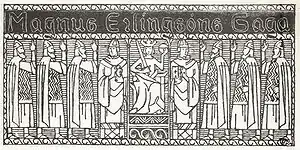1161
Year 1161 (MCLXI) was a common year starting on Sunday (link will display the full calendar) of the Julian calendar.
| Millennium: | 2nd millennium |
|---|---|
| Centuries: | |
| Decades: | |
| Years: |
| 1161 by topic |
|---|
| Leaders |
|
| Birth and death categories |
| Births – Deaths |
| Establishments and disestablishments categories |
| Establishments – Disestablishments |
| Art and literature |
| 1161 in poetry |
| Gregorian calendar | 1161 MCLXI |
| Ab urbe condita | 1914 |
| Armenian calendar | 610 ԹՎ ՈԺ |
| Assyrian calendar | 5911 |
| Balinese saka calendar | 1082–1083 |
| Bengali calendar | 568 |
| Berber calendar | 2111 |
| English Regnal year | 7 Hen. 2 – 8 Hen. 2 |
| Buddhist calendar | 1705 |
| Burmese calendar | 523 |
| Byzantine calendar | 6669–6670 |
| Chinese calendar | 庚辰年 (Metal Dragon) 3857 or 3797 — to — 辛巳年 (Metal Snake) 3858 or 3798 |
| Coptic calendar | 877–878 |
| Discordian calendar | 2327 |
| Ethiopian calendar | 1153–1154 |
| Hebrew calendar | 4921–4922 |
| Hindu calendars | |
| - Vikram Samvat | 1217–1218 |
| - Shaka Samvat | 1082–1083 |
| - Kali Yuga | 4261–4262 |
| Holocene calendar | 11161 |
| Igbo calendar | 161–162 |
| Iranian calendar | 539–540 |
| Islamic calendar | 555–557 |
| Japanese calendar | Eiryaku 2 / Ōhō 1 (応保元年) |
| Javanese calendar | 1067–1068 |
| Julian calendar | 1161 MCLXI |
| Korean calendar | 3494 |
| Minguo calendar | 751 before ROC 民前751年 |
| Nanakshahi calendar | −307 |
| Seleucid era | 1472/1473 AG |
| Thai solar calendar | 1703–1704 |
| Tibetan calendar | 阳金龙年 (male Iron-Dragon) 1287 or 906 or 134 — to — 阴金蛇年 (female Iron-Snake) 1288 or 907 or 135 |

King Magnus V (middle) (1156–1184)
Events
Europe
- February 3 – Battle of Oslo: King Inge I (the Hunchback) is defeated and killed, while fighting the forces of Haakon II (the Broadshouldered). He is succeeded by Haakon with the 5-year-old Magnus V as co-ruler, but not without challenges to his sovereignty.
- Magnus II (Henriksson), pretender to the Swedish throne, is murdered by Charles VII (or Karl), who becomes king of Sweden (until 1167).
- An Almoravid offensive against the Kingdom of Portugal reaches the city of Almada (located on the Tagus River).[1]
Asia
- Jin–Song Wars: The Battle of Tangdao (November 16) and Battle of Caishi (November 26–27) on the Yangtze River, between the Jin Dynasty and the Song Dynasty in China, result in two pivotal Song naval victories.
- December 15 – Wanyan Liang, Chinese prince of Hailing, is assassinated while on campaign. He is succeeded by Emperor Shi Zong of the Jin Dynasty (until 1189).
England
- Spring – Theobald of Bec, archbishop of Canterbury dies after an illness. King Henry II is informed and he expresses the wish to have his friend Thomas Becket elected as his successor.
- Bartholomew Iscanus is elected and consecrated as bishop of Exeter (until 1184).
Religion
- The Cross of Euphrosyne, commissioned by Euphrosyne of Polotsk, is created by craftsman Lazar Bohsa (The cross later went missing during World War II, and has not been recovered).
Births
- September 20 – Takakura, emperor of Japan (d. 1181)
- Alfonso Téllez de Meneses, Spanish nobleman (d. 1230)
- Baldwin IV (the Leper), king of Jerusalem (d. 1185)
- Beatrice of Albon, duchess of Burgundy (d. 1228)
- Belgutei, half-brother of Genghis Khan (d. 1271)
- Börte, wife of Genghis Khan (approximate date)
- Constance, duchess of Brittany (approximate date)
- Da'ud Abu al-Fadl, Ayyubid physician (d. 1242)
- Eleanor of England, queen of Castile (d. 1214)
- Guðmundur Arason, Icelandic bishop (d. 1237)
- Innocent III, pope of the Catholic Church (d. 1216)
- Sancho (or Sanche), Spanish nobleman (d. 1223)
- Sasaki Yoshikiyo, Japanese nobleman (d. 1242)
- Satō Tadanobu, Japanese samurai (d. 1186)
- Tsangpa Gyare, Tibetan Buddhist leader (d. 1211)
Deaths
- February 3 – Inge I (the Hunchback), king of Norway (b. 1135)
- April 18 – Theobald of Bec, archbishop of Canterbury (b. 1090)
- May 12 – Fergus of Galloway, Scottish nobleman
- June 14 – Qin Zong, Chinese emperor (b. 1100)
- September 10 – Tala'i ibn Ruzzik, Fatimid vizier
- September 11 – Melisende, queen of Jerusalem (b. 1105)
- October 12 – Henry V, duke of Carinthia (House of Sponheim)
- October 28 – Imar of Tusculum, French abbot and bishop
- November 21 – William III, count of Nevers and Auxerre
- November 23 – Adam of Ebrach, German monk and abbot
- December 15 – Wanyan Liang, Chinese emperor (b. 1122)
- Akarius Fitz Bardolph, English nobleman and knight
- Hu Hong, Chinese scholar and philosopher (b. 1105)
- Magnus II (Henriksson), king of Sweden (b. 1130)
- Rechung Dorje Drakpa, Tibetan Buddhist leader
- Roger IV, duke of Apulia and Calabria (b. 1152)
References
- Picard, Christophe (2000). Le Portugal musulman, VIIIe-XIIIe Siècle: L'Occident d'al-Andalus sous domination islamique. Paris: maisonneuve & Larose. p. 110. ISBN 2-7068-1398-9.
This article is issued from Wikipedia. The text is licensed under Creative Commons - Attribution - Sharealike. Additional terms may apply for the media files.